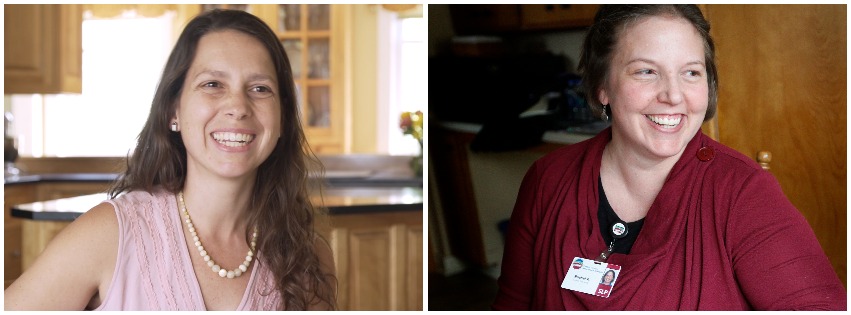
Our Speech-Language Pathologists (SLPs) are trained and certified to provide in-home care, education, and support for individuals of all ages who are living with communication and swallowing disorders. All services are provided in the comfort and privacy of home.
Meet Our Speech-Language Pathologists
Maggie Weiss (above, left) Maggie, who has worked at CVHHH for four years, holds a graduate degree in Communication Sciences from University of Vermont and connects her desire to pursue Speech-Language Pathology with her family’s love of English: “I come from a long line of English majors and wanted to work with speech articulation and language. I was especially inspired by a friend’s daughter who had speech and language delays due to hearing loss that was not diagnosed in infancy.” Maggie enjoys helping people in our community achieve their personal communication and cognition goals by regaining skills and abilities or by learning how to compensate for these skills through exercise and therapy. “It is important for all central Vermonters to know that there are services to help them effectively communicate.”
Rachel Audy (above, right) Rachel, who joined CVHHH in 2006, says that she’s always been fascinated by the many ways that people communicate. “My sister had special needs, and what I learned early on is that with time and patience, she had a lot to say.” Rachel has a graduate degree in Communication Sciences and Disorders from University of New Hampshire. “Everyone should have a way to express their thoughts and feelings. My work allows me to help clients do this and to receive information from the world around them.”
Why Speech-Language Therapy Matters
Communication is Life Many people may not appreciate their ability to communicate until it is lost. From having one’s basic needs met to nurturing relationships and earning a living, communication is at the core.
Causes Speech and language problems in adults can result from a variety of causes, including brain injury; stroke; diseases that affect the brain, such as Alzheimer’s disease, multiple sclerosis, or Parkinson’s disease; breathing problems; cancers occurring in the head and/or neck region; and voice damage.
Types of Speech and Language Disorders in Adults: Problems that may be acquired in adulthood include the following:
- Aphasia This involves problems speaking, understanding, reading, writing, telling time, and/or using numbers. Often misunderstood, aphasia does not affect a person’s intelligence. The most common cause of aphasia is stroke.
- Cognitive-communication disorders Problems with thinking and communication can affect each other. Some examples are difficulty paying attention, remembering, organizing thoughts, and solving problems.
- Apraxia of speech Speech difficulties arise from problems planning motor movements. It is caused by damage to the parts of the brain that are involved in speaking.
- Dysarthria Speech difficulties (e.g., slurred speech) due to weakness of muscles involved in breathing and/or speaking.
- Voice Disorders Changes in pitch, loudness, and vocal quality that negatively impact communication. These may result from nodules on the vocal cord, overuse/misuse of voice (e.g., yelling), diseases such as Parkinson’s or multiple sclerosis, and other causes.
(Information care of American Speech-Language-Hearing Association)
Want to Learn More?
We understand that these are not common terms. If you think that you, or someone you know, would benefit from these services, call our Rehab Coordinator, Carrie Mancini, PT, WCC. You can reach her via email or at 224-2270.